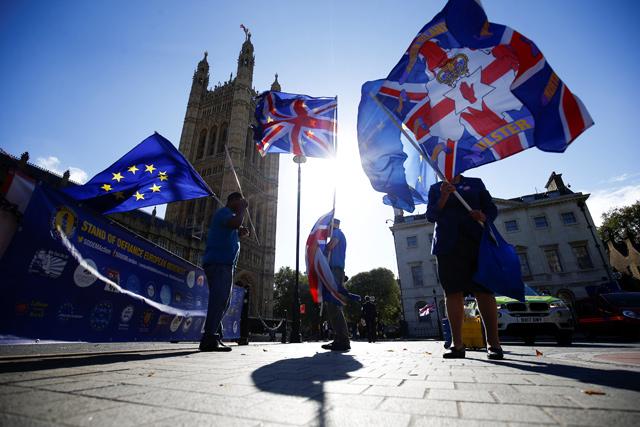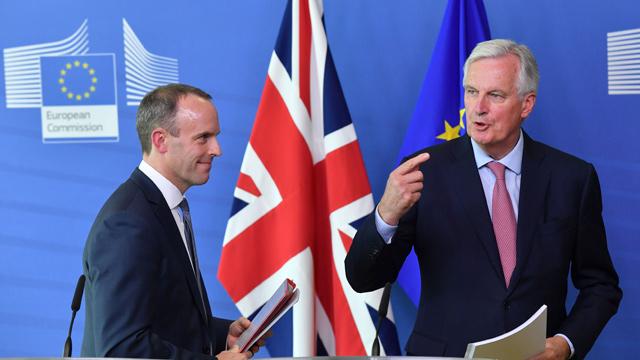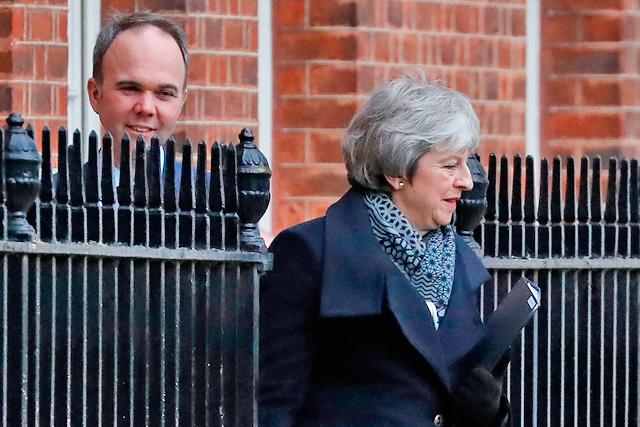You are here
With UK's May under pressure, Brexit diplomacy steps up in Brussels
By Reuters - Oct 15,2018 - Last updated at Oct 15,2018

Anti-Brexit protestrs wave flags outside the Houses of Parliament in London, Britain, on Thursday (Reuters photo)
BRUSSELS/LONDON — British Brexit Minister Dominic Raab will hold talks with the EU's chief negotiator on Sunday, the first in a flurry of formal meetings in Brussels where officials are trying to hammer out agreement on the terms of a divorce deal.
With less than six months until Brexit day and Prime Minister Theresa May due in Brussels for a summit on Wednesday, both sides are holding intensive talks to try to seal an agreement ending Britain's more than 40 years in the European Union.
Raab was due to meet Michel Barnier, the bloc's negotiator, after his department said it was "jointly agreed that face-to-face talks were necessary" on the "big issues still to resolve". Ambassadors to the other 27 EU member states were summoned to another meeting.
It was unclear whether there had been progress on one of the major issues — a "backstop" to prevent a return to controls on the border between the British province of Northern Ireland and EU member Ireland. This arrangement has strengthened opposition to May's plans after her Northern Irish allies accused the bloc of trying to annex the province.
One diplomat said on condition of anonmyity that the ambassadors' meeting could suggest a breakthrough, while another said it could signal there had been no agreement.
Britain's biggest shift in foreign and trade policy for decades is dividing the prime minister's Conservative Party, with critics, such as Raab's predecessor, pressing May to change her strategy.
David Davis, who resigned as Brexit minister in July, accused the government on Sunday of accepting "the EU's language on dealing with the Northern Ireland border".
"This is one of the most fundamental decisions that government has taken in modern times. It is time for Cabinet members to exert their collective authority," wrote Davis, who campaigned for Britain to leave the EU in the 2016 referendum.
"This week the authority of our constitution is on the line," he said in an article in The Sunday Times.
Davis also pressed May to abandon her Brexit proposal, which involves staying in a free trade zone with the EU for manufactured and agricultural goods. The bloc "has rejected it. The public does not like it. Parliament will not vote for it", he wrote.
Lobbying
So far, May has shown little appetite to change tack, trying to persuade Conservative lawmakers and those in the opposition Labour Party to vote for any deal based on her plan.
Lobbying of May from all sides has increased in recent weeks as London and Brussels edge closer to an agreement on a draft withdrawal treaty to cover the divorce terms, a transition period and a solution for Northern Ireland.
Preventing any return of a "hard" border in Ireland has become one of the major obstacles, with Brexit campaigners fearful that a backstop with no time limit will keep Britain inside a customs union with the EU indefinitely.
May insists any customs arrangement as part of the backstop must be temporary, but the EU has refused to set an end date.
Health Minister Matt Hancock suggested the backstop could be temporary without such a date, an argument that may fall flat with some eurosceptic lawmakers who are calling for May to "chuck Chequers", her Brexit plan named after her country residence.
"There are different ways to ensure that something is time limited," Hancock told the BBC. "For instance, you can set conditions at the point at which the arrangements come to an end."
Even if May reaches a withdrawal agreement, she will struggle to get it through parliament and may find opposition from the small Northern Irish party which props up here minority government to other legislation such as the budget.
"I fully appreciate the risks of a 'no deal' but the dangers of a bad deal are worse," Arlene Foster, head of the Democratic Unionist Party, wrote in the Belfast Telegraph newspaper.
"This backstop arrangement would not be temporary. It would be the permanent annexation of Northern Ireland away from the rest of the United Kingdom and forever leave us subject to rules made in a place where we have no say."
Related Articles
BRUSSELS — Britain’s new negotiator Dominic Raab pledged on Thursday to intensify talks with the EU to secure a Brexit deal as fears grew in
LONDON — Prime Minister Theresa May on Monday published further assurances from the EU on the eve of a crucial parliamentary vote on her Bre
BRUSSELS — The EU on Tuesday rejected British Prime Minister Boris Johnson's demand to scrap the Irish border backstop plan to achieve a Bre




















